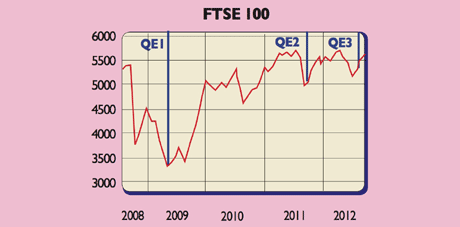Get the latest financial news, insights and expert analysis from our award-winning MoneyWeek team, to help you understand what really matters when it comes to your finances.
You are now subscribed
Your newsletter sign-up was successful
Want to add more newsletters?

Twice daily
MoneyWeek
Get the latest financial news, insights and expert analysis from our award-winning MoneyWeek team, to help you understand what really matters when it comes to your finances.

Four times a week
Look After My Bills
Sign up to our free money-saving newsletter, filled with the latest news and expert advice to help you find the best tips and deals for managing your bills. Start saving today!
Central banks' actions show that the global economy is looking ever more sickly, says The Guardian. Last Thursday alone the European Central Bank cut interest rates by a quarter of one per cent to 0.75%, the lowest rate in the 14 years since its inception.
The Bank of China cut rates for the second time in a month. The Bank of England launched a third round of quantitative easing (QE3), or money printing. It is to buy another £50bn of UK government bonds with electronically created money. It will soon have injected a total of £375bn into the economy in this way. America may also soon launch QE3.
America is a mess
Most of Europe is "sinking ever deeper into recession and threatening to drag many of the developing countries that depend on it for their exports with it", says Alan Abelson in Barron's. But if the eurozone did not exist, the world would be focused on America, says the FT. The US is suffering from the weakest growth and employment for this stage of a recovery since World War II. Payroll growth has slowed sharply in recent months and unemployment is still over 8%.
MoneyWeek
Subscribe to MoneyWeek today and get your first six magazine issues absolutely FREE

Sign up to Money Morning
Don't miss the latest investment and personal finances news, market analysis, plus money-saving tips with our free twice-daily newsletter
Don't miss the latest investment and personal finances news, market analysis, plus money-saving tips with our free twice-daily newsletter
Manufacturing is shrinking and service sector activity is at a two-and-a-half-year low. Consumption is lacklustre. The economy faces automatic spending cuts and tax hikes worth a massive 5% of GDP on 1 January if Congress doesn't agree to postpone or change them hardly a safe bet in an election year.
"Corporations are starting to pull back in the face of a eurozone recession and policy uncertainty in the US," says Bank of America Merrill Lynch. That, along with the global slowdown, is denting profit prospects. Earnings estimates look set to be trimmed further, and not only in America.
Central banks to the rescue?
The British economy has "stubbornly refused to expand for the past year and a half" despite the printed money thrown at it so far, says Sam Fleming in The Times. "It is not entirely clear why."
The Bank of England thinks yet another dose will do the trick. "In terms of feeding through to businesses and consumers", there has been scant sign of improvement, says Fxpro.com. The key problem with QE on bothsides of the Atlantic is not the availability of money, but a lack of demand. After a financial crisis, consumers spend years more concerned with working off their debt. Companies that aren't doing the same tend to be reluctant to put cash to work given the subdued environment.
In these circumstances, trying to boost the economy through money printing is akin to "pushing on a string". In America the impending "fiscal cliff" is going to make post-bubble corporate America even more cautious about hiring and expanding, says Stephanie Pomboy of MacroMavens.
Are markets waking up?

Markets have responded positively to central banks' liquidity injections since the crisis. However, diminishing returns have set in, as the chart above, highlighted by Fidelity's Tom Stevenson, illustrates.
Markets were initially buoyed by hopes that QE can boost growth, while some of the money inevitably leaked into asset markets, providing a further fillip. But more and more investors may be starting to acknowledge that QE does little for growth.
The fact that central banks are having to resort to a shot of free money reflects a dismal fundamental environment even if it does mean liquidity leaks into equity markets. Don't mistake any rise in equities over the next few months for the beginning of a sustainable bull run.
Get the latest financial news, insights and expert analysis from our award-winning MoneyWeek team, to help you understand what really matters when it comes to your finances.
MoneyWeek is written by a team of experienced and award-winning journalists, plus expert columnists. As well as daily digital news and features, MoneyWeek also publishes a weekly magazine, covering investing and personal finance. From share tips, pensions, gold to practical investment tips - we provide a round-up to help you make money and keep it.
-
 How a ‘great view’ from your home can boost its value by 35%
How a ‘great view’ from your home can boost its value by 35%A house that comes with a picturesque backdrop could add tens of thousands of pounds to its asking price – but how does each region compare?
-
 What is a care fees annuity and how much does it cost?
What is a care fees annuity and how much does it cost?How we will be cared for in our later years – and how much we are willing to pay for it – are conversations best had as early as possible. One option to cover the cost is a care fees annuity. We look at the pros and cons.

